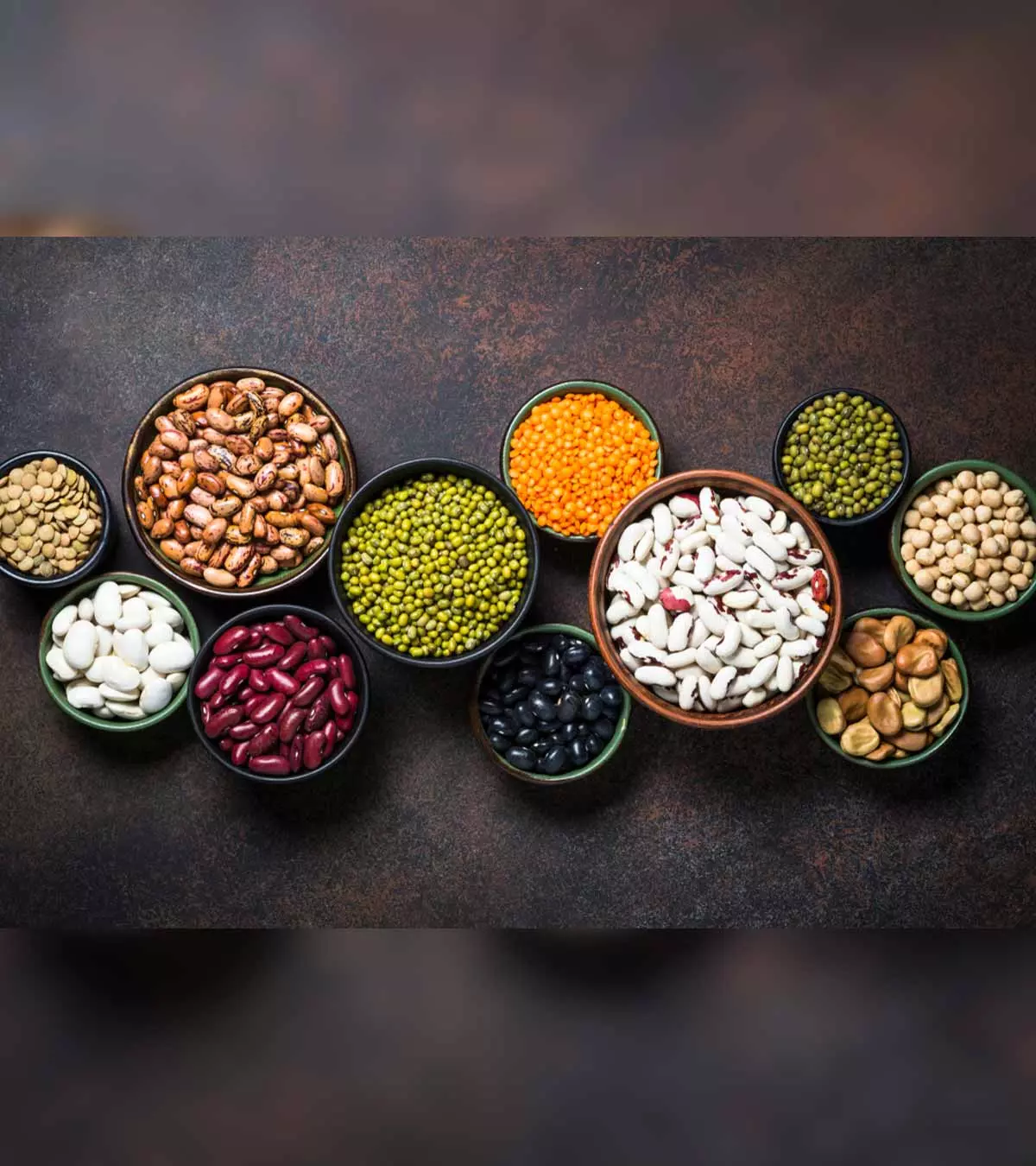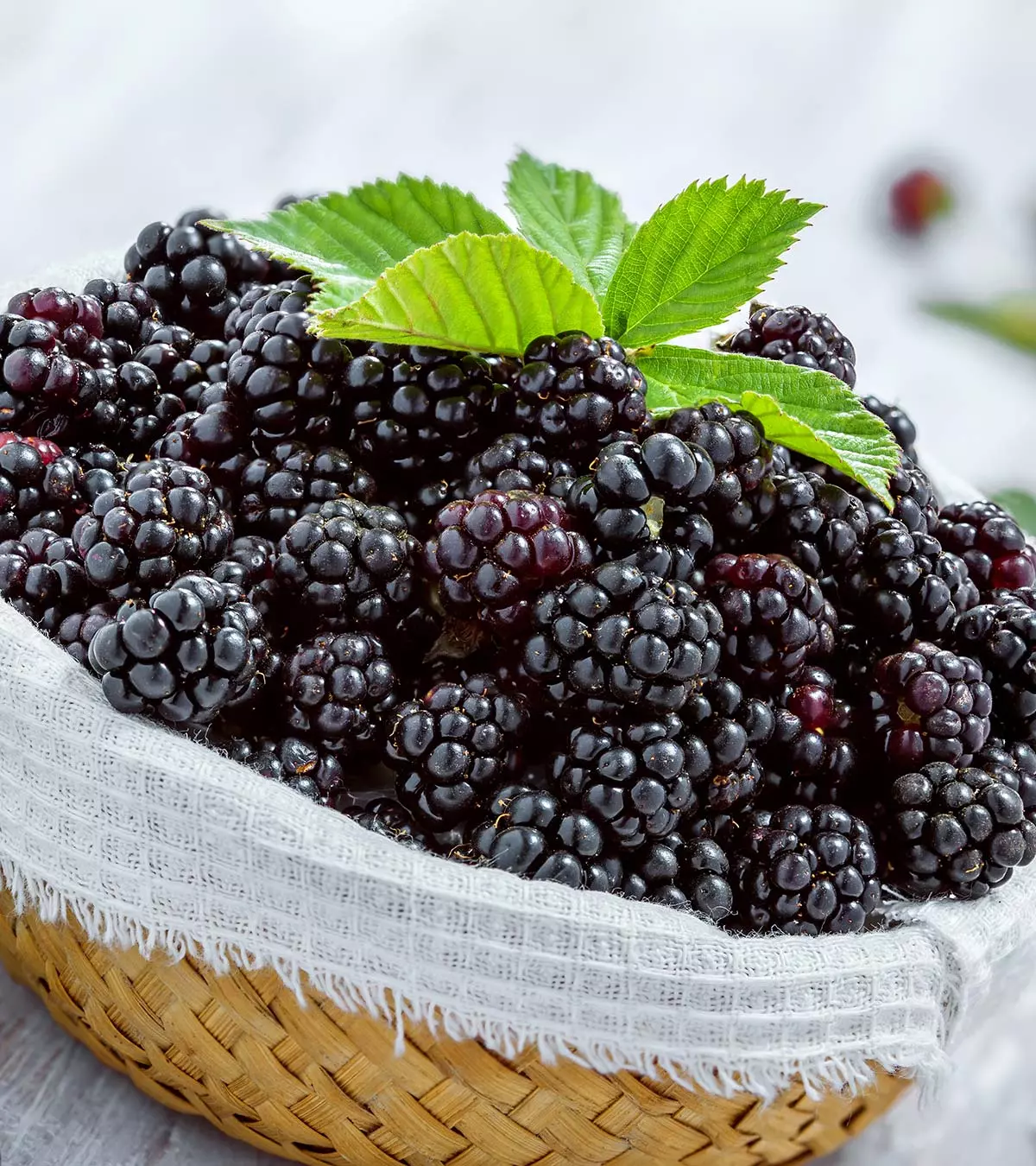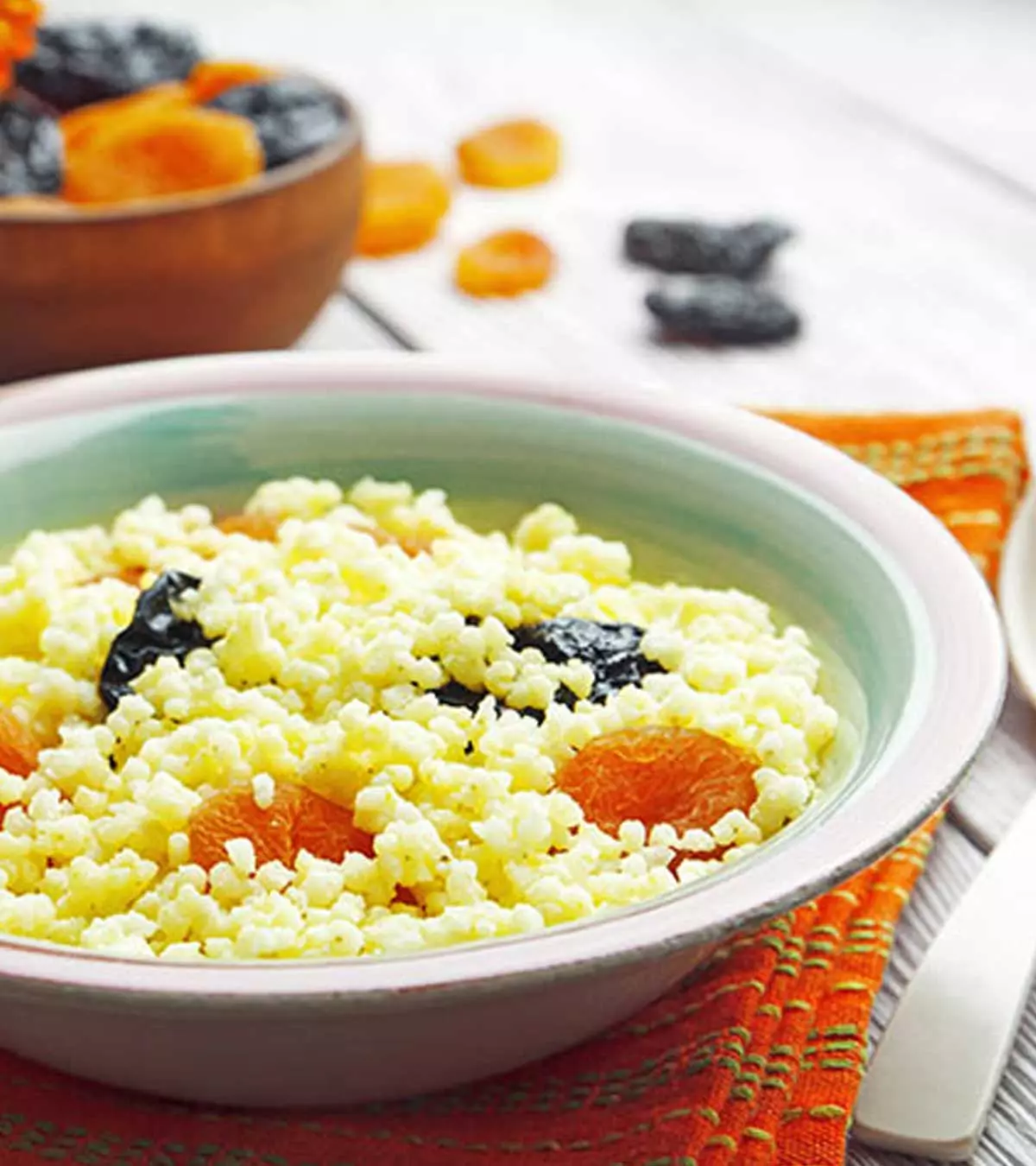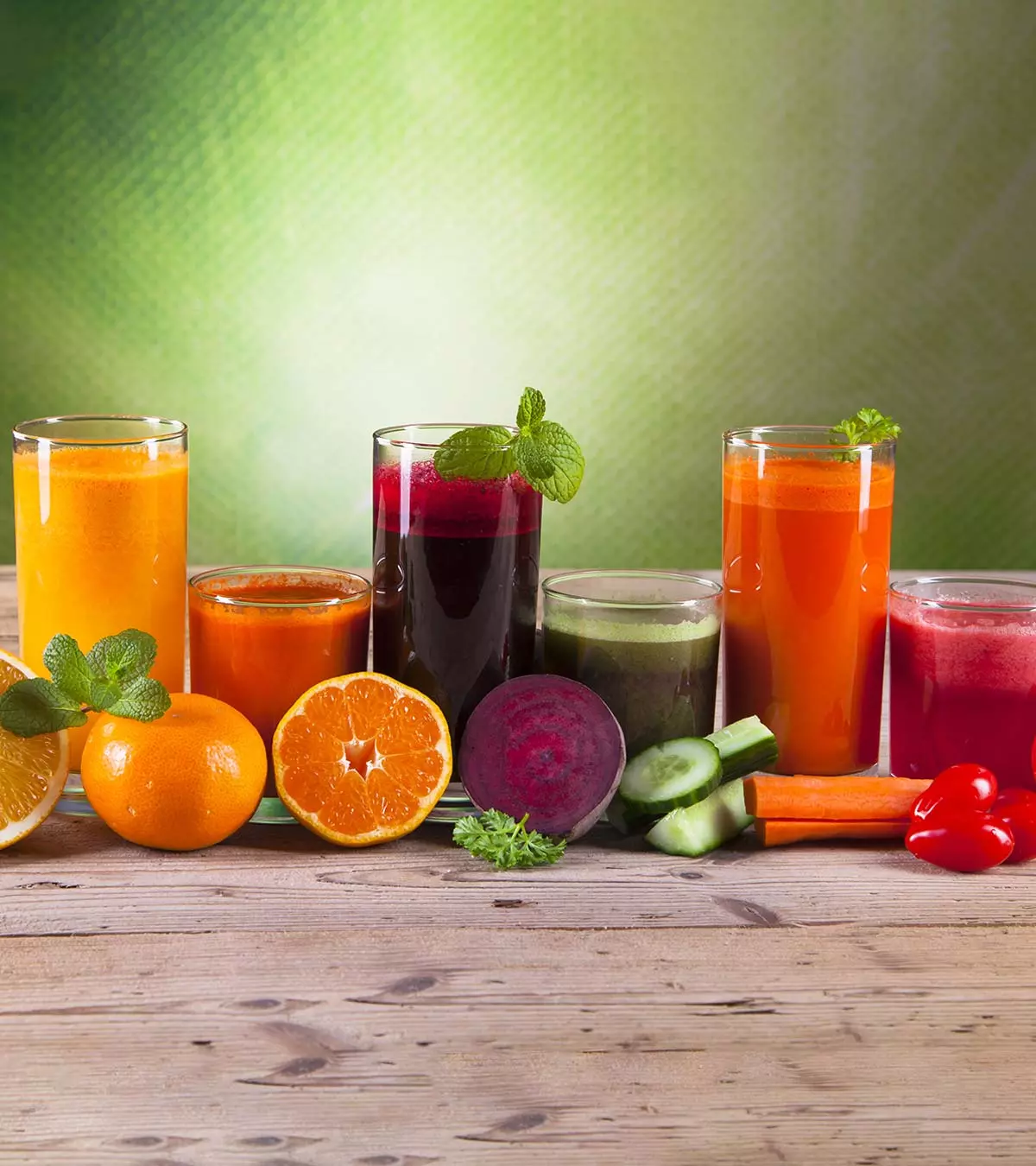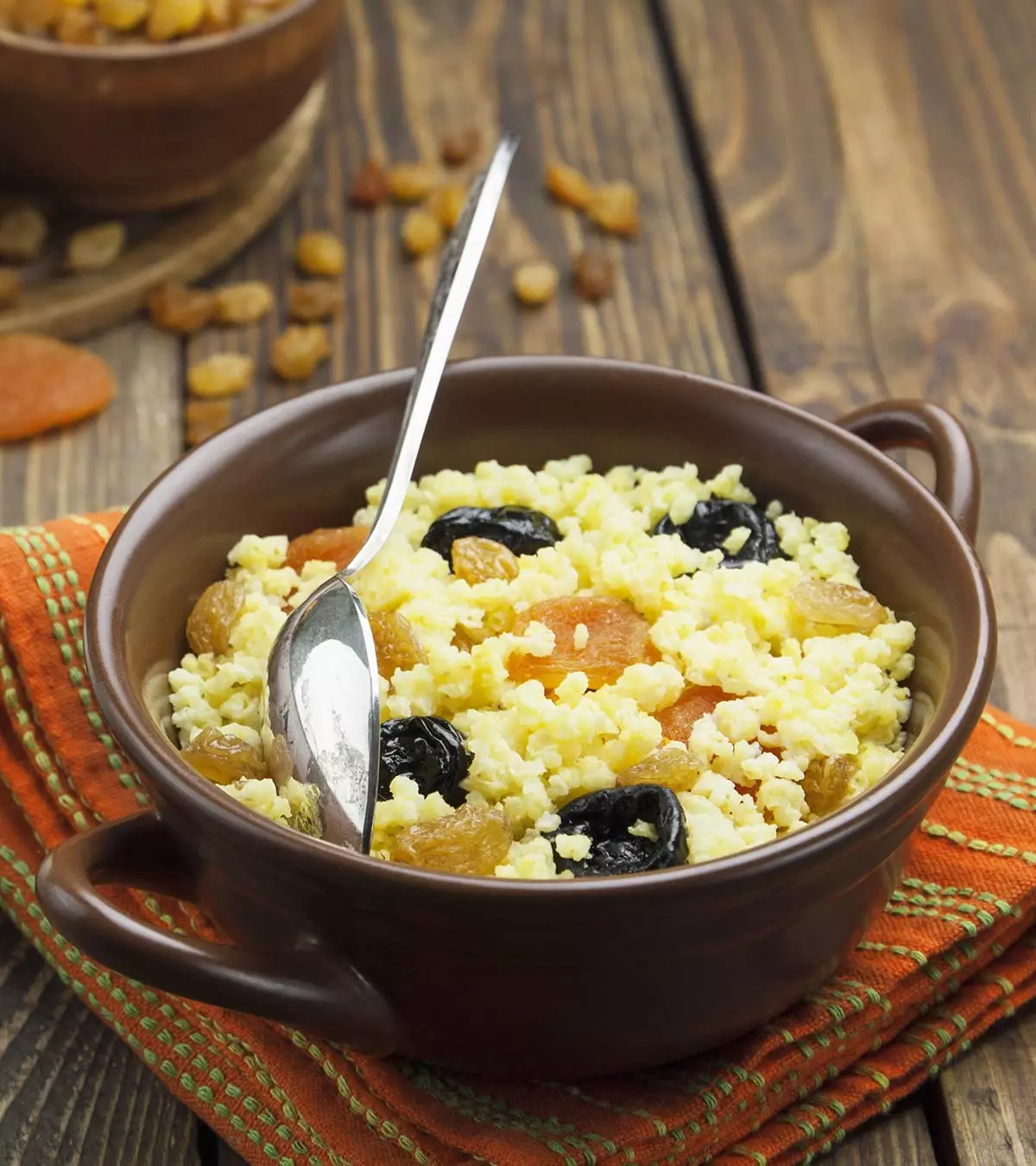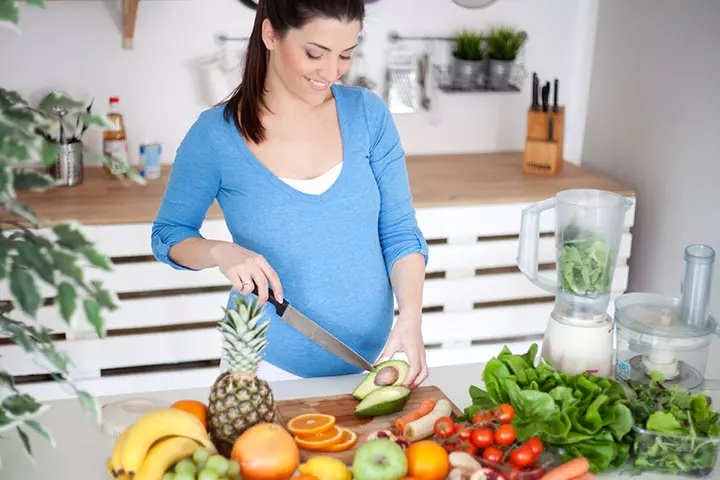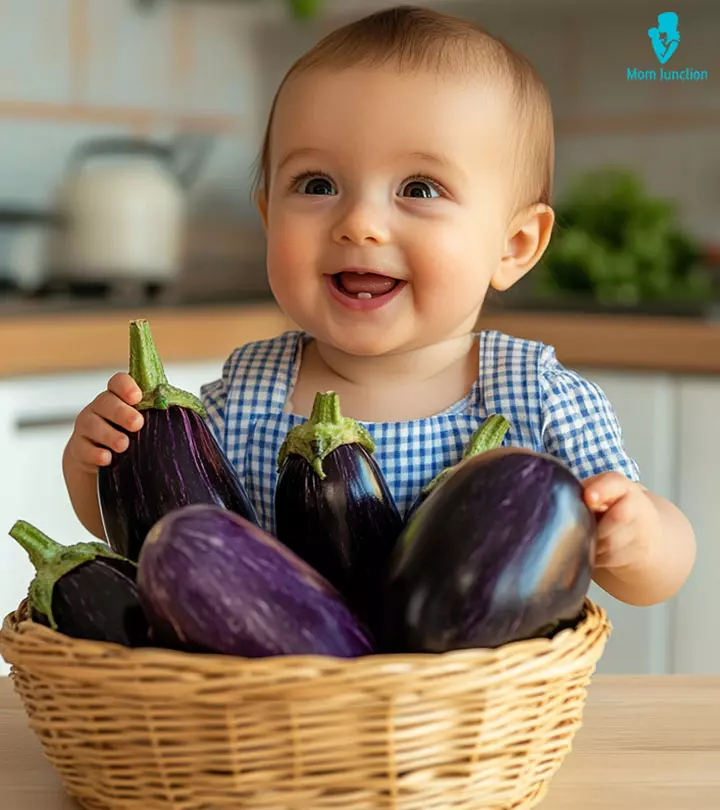
Image: Midjourney/ MomJunction Design Team
Eggplant, also known as solanum melongena, aubergine, berenjena, or brinjal, is a nutritious food that comes in several varieties. This round and slender egg-shaped food with purple-black peel is mostly used as a vegetable. You can use eggplant for babies to make various delicacies.
Including this bright and colorful food in your infant’s weaning diet can help them get more nutrients. Read on as we tell you more about the right age to feed eggplant to babies, its health benefits, and some delectable eggplant recipes that you may want to try.
Key Pointers
- Eggplants are safe for babies and can be introduced into their diet after six to seven months.
- Eggplant mash or puree can help provide various vitamins, minerals, and fiber to a baby’s diet.
- Eggplant can be combined with other foods to enhance flavor and add nutrients.
- The bioactive compounds found in eggplant possess antimicrobial and anti-inflammatory properties.
- It is crucial to monitor for any signs of allergy or sensitivity after introducing eggplant to babies.
- If there is a family history of allergies, it is best to seek advice from a doctor before adding eggplant to a baby’s diet.
When Can Babies Have Eggplant?
Infants can usually consume eggplant as soon as they are ready for solids, which is generally from the age of six to seven months (though each baby takes its own time). You can first introduce cooked, deseeded eggplant as a mash or a puree. Eggplant is versatile and can be mixed with a variety of foods. Once the baby is comfortable with the food, gradually introduce steamed, boiled, roasted, grilled, or baked eggplant slices as finger foods.
Avoid feeding raw eggplant to babies and toddlers since it contains compounds that can irritate the digestive system (1). Eggplant belongs to the same family as tomatoes and chili peppers. If these do not suit your baby, then do consult a doctor before introducing eggplant.
Nutritional Value Of Eggplant
Eggplant can provide several vitamins, such as vitamin A and folate, minerals, a good amount of calcium, dietary fiber, and phytochemicals in considerable amounts. One cup (99 grams) of boiled eggplant prepared without salt can approximately provide the following nutrients (2) (3) (4) (5).
| Name | Amount | RDA (7-12 months) |
|---|---|---|
| Water | 88.8g | – |
| Energy | 34.6Kcal | – |
| Carbohydrate, by difference | 8.64g | – |
| Fiber, total dietary | 2.48g | – |
| Magnesium, Mg | 10.9mg | 60mg |
| Potassium, K | 122mg | 700mg |
| Zinc, Zn | 0.119mg | 5mg |
| Manganese, Mn | 0.112mg | 0.6mg(AI)* |
| Folate, total | 13.9µg | 80µg(AI) |
| Vitamin A, IU | 36.6IU | 375RE** |
| Vitamin K | 2.87µg | 10µg |
Sources: U.S. Department of Agriculture, World Health Organization, and Oregon State University
*AI = Adequate Intake
**RE = Retinol Equivalent
Possible Health Benefits Of Eggplant For Infants
Feeding eggplant with different types of foods in moderation can benefit your infant in the long run. Most of these benefits are due to the vitamins and bioactive compounds, like phenols, carotenoids, and alkaloids found in eggplant (6).
- Supplies several nutrients: One cup of cooked eggplant contains 2.48 grams of dietary fiber to facilitate smooth bowel movement. Besides, it offers notable amounts of dietary folate, thiamine, niacin, vitamins A, C and K, potassium, calcium, magnesium, and manganese to support the baby’s growth and development.
- Provides antioxidants and phytochemicals: Eggplant contains several antioxidants and phenolic compounds, like anthocyanins and flavonoids. Nasunin, an anthocyanin, from eggplant could protect the brain from oxidative damage (6) (7) (8). Phenolic compounds in eggplant, such as chlorogenic acid, could have anti-inflammatory and antimicrobial effects (9). All these help to improve heart health and phytonutrients increase brain function.
Eggplant has been in use in traditional medicine to treat several conditions, such as warts, burns, and inflammatory diseases, like stomatitis and gastritis (7).
How To Select And Store Eggplant?
Selecting eggplants can be tricky as some of them are bitter or too seedy. Below are some simple steps to follow for selecting and storing eggplants (10).
Selection tips:
- Buy eggplants that are firm and heavy, with a clean peel and vivid color.
- Check ripeness by lightly pressing the skin. If the skin does not spring back, it indicates overripening.
- Discard eggplants that look shriveled and have bruises, pits, and scars.
- Check for blemishes. An eggplant with too many blemishes indicates that it is possibly decaying.
- Select eggplants that have smooth and shiny skin
 Quick tip
Quick tipStorage tips:
- Keep the eggplant in a paper bag or loosely wrap them in a paper towel and store in the refrigerator. Putting them in a glass container is the best way to store them as they are delicate vegetables.
- Keep the refrigerator temperature between 10 and 12°C (50 and 54°F) to prevent the eggplants from spoiling.
- Place the crisper drawer away from fruits, like melons, bananas, tomatoes, etc., as they produce ethylene gas that may cause the eggplant to over ripen.
- Try to use stored eggplants within three to seven days of purchase, and only cut when you are ready to cook or use it.
- You can store eggplants for up to eight months by blanching or steaming the peeled eggplant slices/cubes.
Precautions To Take While Feeding Eggplant To Babies And Toddlers
Take these precautions while feeding eggplant to your baby.
- Introduce eggplant in a pureed or mashed form prepared by steaming/boiling the peeled and deseeded eggplant. As your baby gets comfortable with the taste and digestibility, feed the whole eggplant (with peel). If your baby has had digestive issues, it would be better to introduce it without the skin.
- Begin by feeding a teaspoon in a meal and increase the intake gradually.
- If the baby looks uncomfortable after ingesting eggplant, discontinue feeding and try again after some time.
- Check for signs of allergy, sensitivity, or intolerance. Eggplant allergy is rare but possible. Its symptoms may come up immediately after ingestion or hours after the intake (11). However, in some cases, the symptoms may appear for the first time, but if you reintroduce eggplant after a few days, the symptoms could gradually vanish. For instance, Juhi Kumar, a mother, shares her baby’s reaction to being fed eggplant. She says, “My daughter developed some redness around her mouth after eating eggplant for the first time. I stopped immediately and reintroduced it a month later with no issues (i).”
 Quick fact
Quick fact- If the baby has a family history of nightshade allergy (tomato, chili peppers, Cape gooseberry), birch pollen, or grass pollen allergy, then consult a doctor before introducing eggplant.
- For toddlers, give thinly sliced pieces of baked, steamed, stewed, Mediterranean-style roasted, or grilled eggplant as finger foods to prevent choking.
 Quick tip
Quick tipTasty Eggplant Recipes For Babies and Toddlers
Below are some healthy and delightful eggplant recipes for babies above seven months of age. When cooked well, these recipes will help your baby’s taste buds to discover some new flavors.
1. Eggplant puree
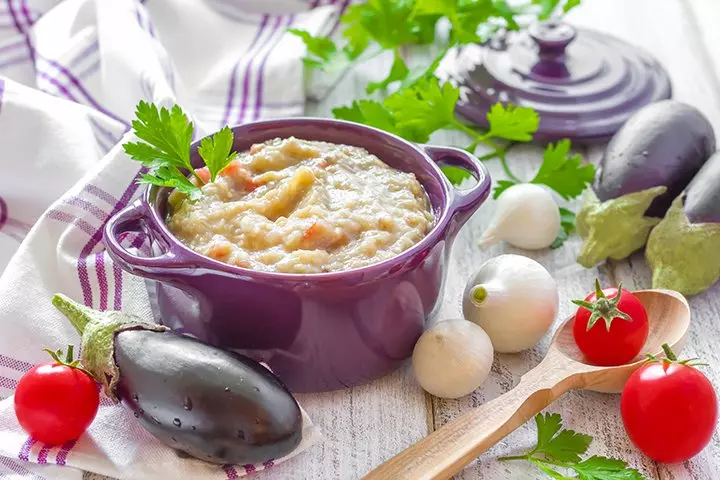
You will need:
- 1 cup organic eggplant (peeled, deseeded, and chopped)
- 1/8 tsp cinnamon powder
How to:
- Steam the eggplant pieces until they turn soft and mushy and keep them aside to cool. Alternatively, you can cut the eggplant in half and bake.
- Blend the pieces into a smooth puree and ensure no lumps are left.
- Add cinnamon powder to the puree, mix well, and add water to achieve a thin and smooth consistency, if required.
2. Eggplant, plum, and pear puree
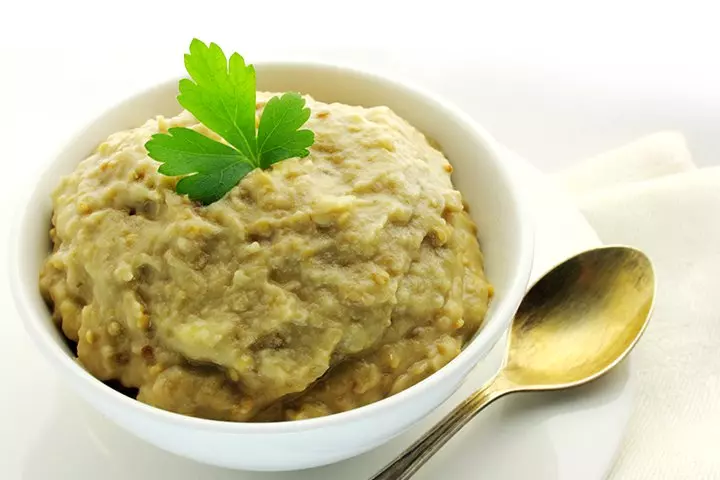
You will need:
- 1 cup eggplant (peeled and chopped)
- 2 plums (peeled, deseeded, and chopped)
- 1 pear (peeled, deseeded, and chopped)
How to:
- Steam the pear, plum, and eggplant in a steamer for about 15 minutes or until they turn soft.
- After steaming, set the fruits aside to cool.
- Blend the steamed fruits into a smooth puree. Ensure no lumps or chunks are left.
- Serve immediately with lightly toasted bread or add it to baby cereal.
3. Eggplant and cheese
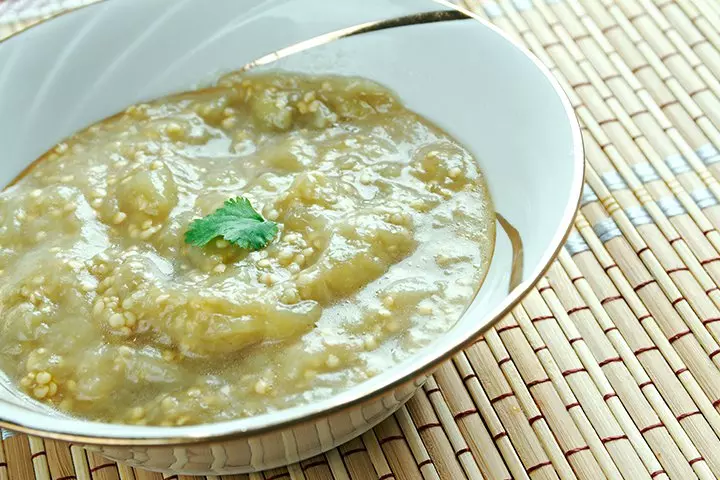
You will need:
- 1 cup eggplant pieces
- 2 tsp cheese (grated)
- 1 tsp dried basil flakes
- 1 tbsp virgin olive oil
How to:
- Preheat the oven to 190°C (375°F). Line the baking tray with baking paper.
- Cut the eggplant into thin slices and brush them with some olive oil and small amount of basil flakes.
- Place the slices on the baking tray and bake for 25-30 minutes or until tender.
- Take out the baking tray from the oven and sprinkle the cheese over the eggplant slices.
- Return the tray to the oven and bake for five to ten minutes.
- You may chop or dice for finger food and serve immediately with homemade tomato sauce for added flavor and taste.
- You can bake some other seasonal vegetables, like sweet potato and beans, along with eggplant slices to fill the dish with colors and flavors.
4. Eggplant sauté
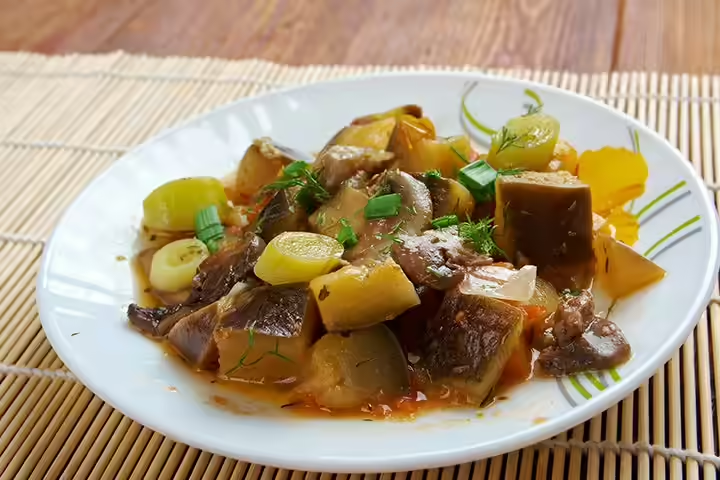
You will need:
- 1 cup eggplant (thinly chopped)
- ½ cup of onion (chopped)
- ½tsp garlic powder
- ¼tsp basil powder
- ¼tsp pepper powder
- 2 tbsp olive oil
How to:
- Heat oil in a saucepan on medium heat and sauté onions for five minutes.
- Add peeled and diced eggplant, garlic powder, basil powder, and pepper powder into the saucepan, and cook until the eggplant becomes soft.
- Serve warm with rice, noodles, or any other cereal or grain of your choice.
- Make this recipe colorful and healthier by adding different vegetables and roasted sesame seeds.
5. Roasted baby eggplant
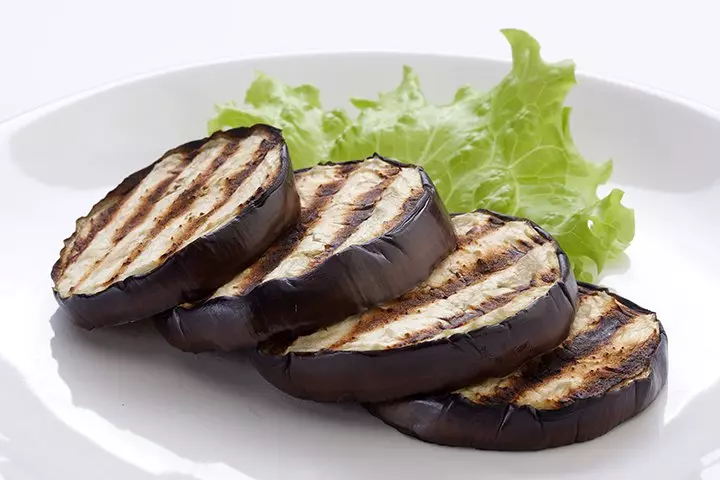
You will need:
- 4 baby eggplants
- 2 garlic cloves (finely chopped)
- 1/4 cup oregano sprigs
- 1 tsp kosher salt
- ½tsp black pepper powder
- ¾ cup olive oil
- feta cheese (crumbled)
How to:
- Preheat the oven to 232°C (450°F).
- Slice the eggplants in half vertically (lengthwise).
- Line a baking tray with baking paper and place the eggplants on it with each piece at least a centimeter apart.
- Add oregano, salt, garlic slices, pepper powder, and olive oil in a small bowl and mix the ingredients well.
- Coat the eggplants with the mixture, cover the baking tray with a foil, and let the eggplants roast in the oven for 40 minutes.
- Once done, remove the foil and bake the eggplants for an additional five minutes.
- Place the eggplants on a serving plate, sprinkle feta cheese generously, and serve immediately.
- You can add lemon juice to the seasoning mix to make the recipe tangy.
6. Mildly spiced tomato and eggplant curry
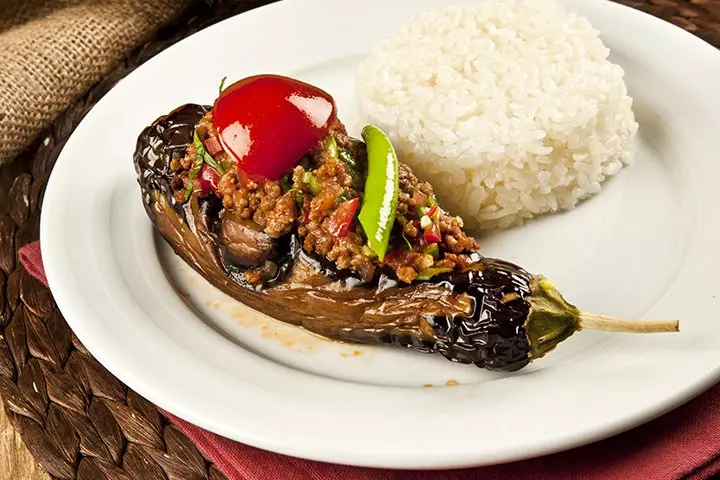
You will need:
- 1 cup eggplant pieces (cut into 1/2-inch pieces)
- 1 onion (chopped)
- 2 cherry tomatoes (halved)
- 1 cup of chickpeas (cooked)
- 1/2 tsp kosher salt
- 1/2 tsp black pepper powder
- 1 tbsp olive oil
- 2 tsp curry powder
- ½ cup fresh basil
How to:
- Heat oil in a saucepan on low heat, add the onions, and cook for about five minutes or until they soften.
- Add eggplants, tomato, curry powder, eggplant, salt, and pepper powder, and cook for about two minutes.
- Pour two cups of water and bring the mix to boil. Reduce the heat and simmer for 15 minutes.
- Add chickpeas to the mix and cook the mix for about five minutes.
- Switch off the flame, transfer the curry into a serving bowl, and add basil.
- Mash rice with a fork and serve it with the curry.
7. Eggplant lasagna

You will need:
- 2 eggplants (thinly sliced lengthwise)
- ½ pound tomatoes (halved and deseeded)
- ¼ cup parmesan cheese
- 1 cup Italian bread crumbs
- 1 large egg
- 1 tsp garlic (roughly chopped)
- 1/2 tsp kosher salt
- 1/4 tsp black pepper powder
- 4 tbsp virgin olive oil
How to:
- Preheat the oven at 190°C (375°F) and line a baking tray with a teaspoon of olive oil.
- Take a small mixing bowl, whisk the egg in it thoroughly, with some water, and keep it aside.
- Take another mixing bowl, add parmesan cheese, bread crumbs, salt, and black pepper in it and mix the ingredients well to prepare the coating mix.
- Make the top sauce by blending garlic, tomatoes, salt, and pepper.
- Dip eggplant slices into the egg, coat them with coating mixture, and place the slices on the baking tray.
- Pour the top sauce over the eggplant slices and bake for about 20 to 25 minutes or until the cheese starts melting, and the sauce begins to bubble.
- You can add different vegetables, like bell peppers, or which your baby can digest well to this recipe to up its nutritional value.
8. Grilled eggplant
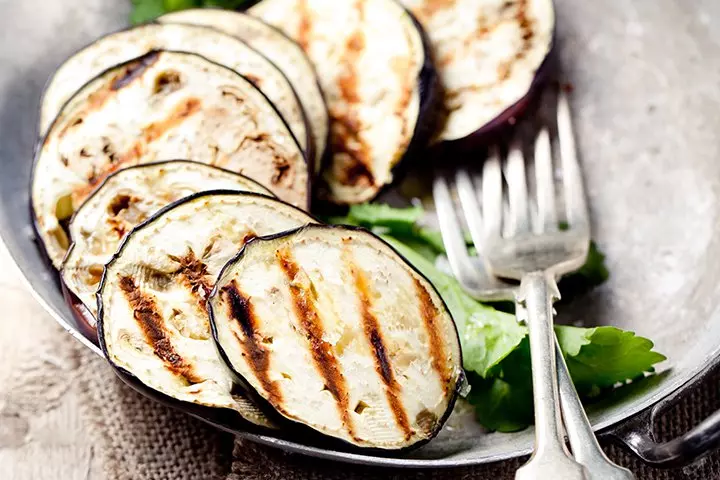
You will need:
- 3 small eggplants (thinly sliced)
- 1 cup thick-sliced mild provolone
- ½tbsp balsamic vinegar
- ½tsp pepper powder
- ¼ tsp dried oregano
- ½tsp kosher salt
- 2 tbsp olive oil
How to:
- Mix olive oil, vinegar, and dried oregano in a mixing bowl and brush the mixture on both sides of the eggplant slices.
- Sprinkle salt and pepper on the eggplant slices and grill them until they turn brown from the side facing the grilling net’s heat.
- Flip every slice, top them with a slice of provolone, and grill for about three minutes or until the cheese starts to bubble.
- Serve immediately with homemade hummus sauce and grilled chicken/tofu/bread to make a complete meal.
9. Cheesy eggplant slices
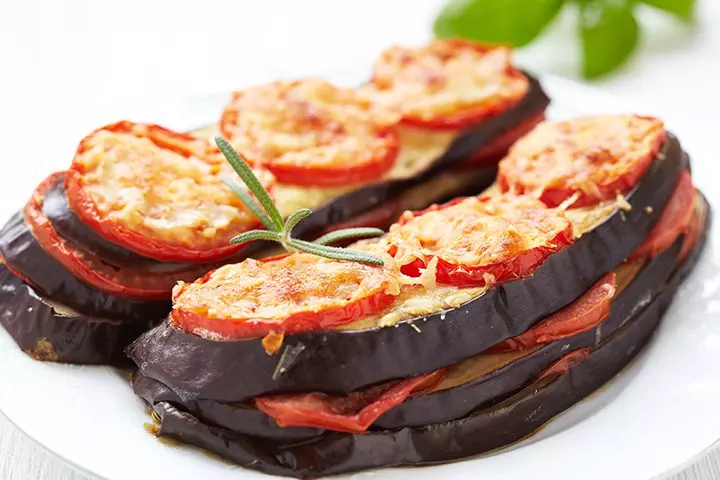
You will need:
- 4 baby eggplant (fresh)
- ½tsp minced garlic
- 1 cup mozzarella cheese (shredded)
- 2 tbsp Italian cheese blend
- 1 tbsp parsley (chopped)
- 1 cup bread crumbs
- 1 tbsp dried oregano
- Salt and pepper to taste
How to:
- Cut the eggplant into halves, rub kosher salt onto each slice, and keep them aside for 15 minutes.
- Meanwhile, lightly roast the bread crumbs in a flat pan on medium to low flame.
- Mix bread crumbs, garlic, cheese, chopped parsley, salt, and pepper into a mixing bowl.
- Coat each eggplant slice with the mixture and keep them aside on a plate.
- Keep a large skillet on medium heat, add some oil, and put eggplant slices in it as the oil warms. You can even add spinach to enhance its nutritional value.
- After ten minutes, flip the side and sprinkle mozzarella cheese and dried oregano and cook until the cheese starts melting.
- Place the cheesy slices on a serving plate and serve warm with homemade mint dip, hummus, or tomato sauce.
10. Eggplant parmesan stick

You will need:
- 1 medium eggplant (peeled)
- ⅓ cup of all-purpose flour
- ¼ cup parmesan cheese (grated)
- ½ cup bread crumbs
- 2 large eggs (whisked)
- ½ teaspoon salt
- Olive oil cooking spray
How to:
- Cut the eggplant into two-inch-thick sticks and keep them aside.
- Mix the flour and salt in one bowl and bread crumbs and parmesan in another.
- Beat the eggs in the third bowl.
- Preheat the oven at 218°C (425°F).
- Lightly spray the baking tray with cooking oil spray.
- Dip the eggplant sticks first in the flour mixture, second egg, and third breadcrumbs.
- Place the sticks on the baking sheet and bake for 25-30 minutes or until the outside turns golden brown. This makes it crispy on the outside and creamy and tender inside.
- Serve warm with a bowl of vegetables or multi-beans.
Frequently Asked Questions
1. Can eggplant cause diarrhea in babies?
Yes. Eggplant or aubergine is one of the most potent foods that can cause an allergy (11). Hence, if your baby is allergic to eggplants, it can cause allergic symptoms such as diarrhea (12).
2. Is my baby allergic to eggplant?
If you observe allergic symptoms such as rashes, vomiting, hives, swelling, and diarrhea after introducing eggplants to your baby’s diet, your baby could be allergic to this vegetable (12).
3. Is organic eggplant preferable for babies?
Organically farmed eggplants are grown free of all chemicals and would be the ideal choice. Organic farming only includes the use of natural fertilizers and pesticides. You can run this by your healthcare provider before incorporating it into your child’s diet.
4. Does eggplant cause constipation in babies?
Dr. Rimas Geiga, a medical doctor and registered dietician from Lithuania, opines, “While eggplant itself is not known to cause constipation in babies, every little tummy reacts differently to new foods. Some babies may experience changes in bowel movements when introducing certain solids, including eggplant. To mitigate any potential issues, ensure your baby stays hydrated and continues to receive a balanced diet with plenty of fiber-rich foods.”
5. Can I mix eggplant with other vegetables?
Yes, you can mix eggplant with several vegetables for babies. Try blending steamed eggplant with peas, carrots, tomatoes, or sweet potatoes for a smooth puree. You can also add a pinch of pepper or cinnamon for extra flavor.
Eggplant is a nutritious vegetable that can be included in a baby’s diet. When introducing eggplant for babies, try the pureed version. Once they are comfortable with the blended form, you may feed it as finger food. Follow the three/five-day rule when introducing eggplant to babies for the first time to ensure they are not allergic to the vegetable. We have listed a few eggplant recipes for babies that you could try. You may also increase the nutrition profile of eggplants by including other suitable vegetables for babies. If you have any concerns regarding the feeding of eggplant to a baby, consult your pediatrician.
Infographic: Precautions To Take When Giving Eggplant To Babies
Eggplant or brinjal can be used to make several exciting and delicious dishes. But, while you are introducing this vegetable to your baby or toddler, there are certain things that you need to be mindful of. In the following infographic, we have made a list of the points you should look for. Do give it a read. Illustration: Momjunction Design Team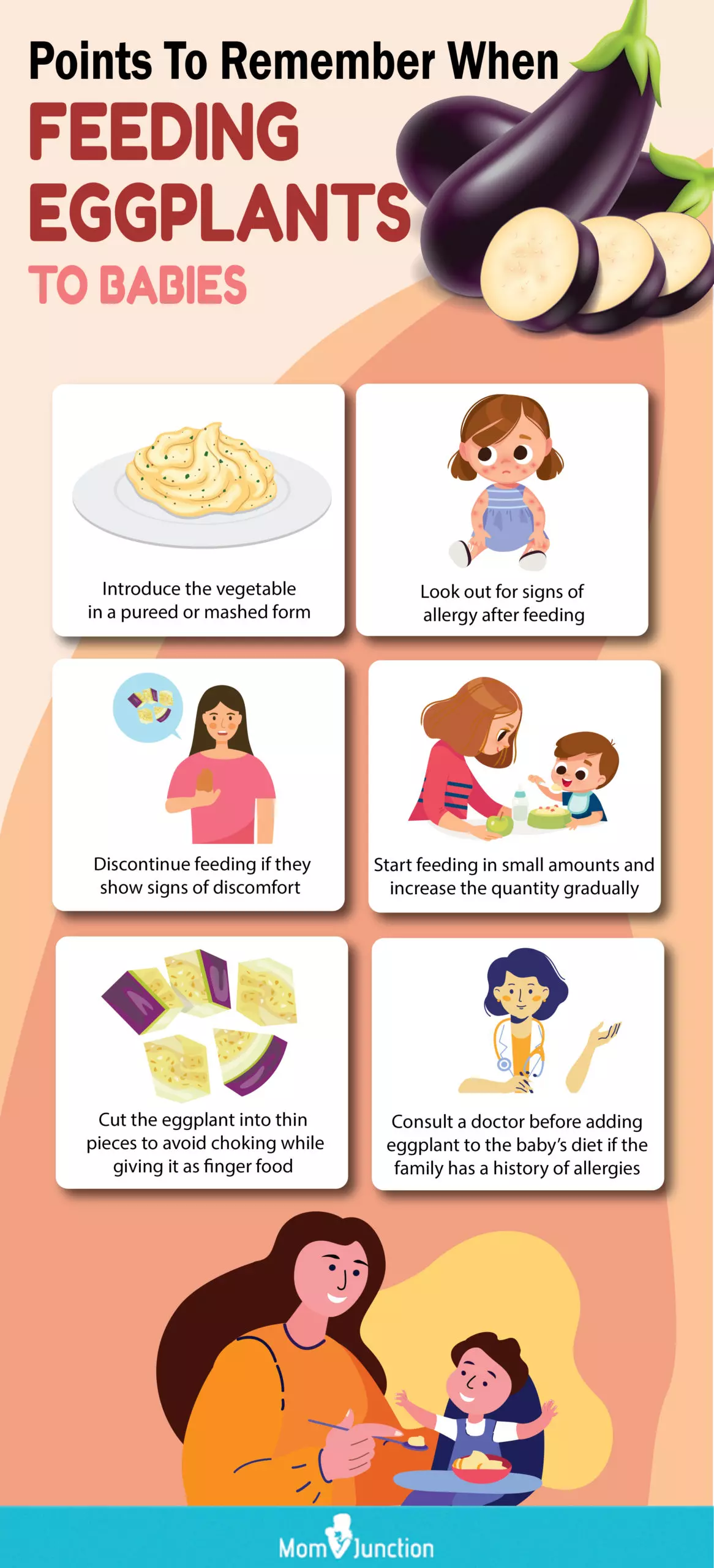
Illustration: Eggplant (Brinjal) For Baby: 10 Recipes And Health Benefits
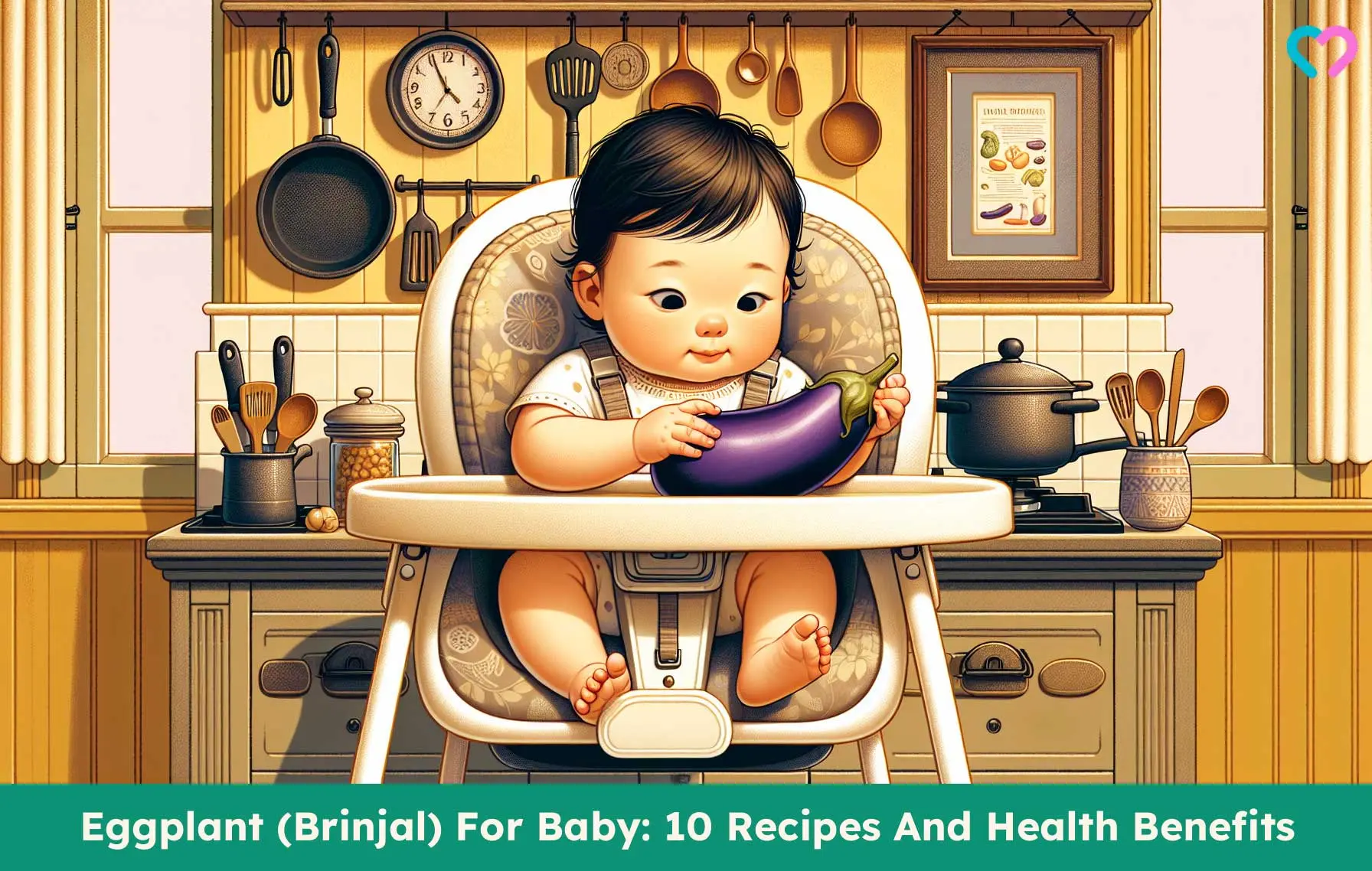
Image: Dall·E/MomJunction Design Team
Find a tasty recipe with chicken and eggplant for your 8-month-old. Boost your baby’s growth by watching the recipe video to ensure they get the important nutrients they need.
Personal Experience: Source
MomJunction articles include first-hand experiences to provide you with better insights through real-life narratives. Here are the sources of personal accounts referenced in this article.
i. Baby-led weaning: let your child self-feed from 6 months;https://medium.com/modern-parent/baby-led-weaning-let-your-child-self-feed-from-6-months-f2dbafaa23ba
References
1. Eggplant (Solanum Melongena); UIC Heritage Garden
2. Eggplant, cooked, boiled, drained, without salt, FDC ID: 169229; FoodData Central; USDA
3. Feeding and nutrition of infants and young children; WHO
4. Manganese; Oregon State University
5. Folate; Oregon State University
6. NergizGürbüzÇolak et al.; Health benefits and bioactive compounds of eggplant; Researchgate
7. Muhammad YasirNaeem and SenayUgur Or Ozgen; Nutritional Content and Health Benefits of Eggplant; Researchgate
8. Y Noda et al.; Antioxidant activity of nasunin, an anthocyanin in eggplant peels; NCBI
9. Georgiana Horincar et al.; Value-Added Pastry Cream Enriched with Microencapsulated Bioactive Compounds from Eggplant (Solanummelongena L.) Peel; MDPI
10. Delayed Ripening Technology; International Service for the Acquisition of Agri-biotech Applications
11. Allergy to eggplant (Solanummelongena); Journal of Allergy and Clinical Immunology
12. Food Allergy; American College of Allergy, Asthma & Immunology
13. Mudnakudu N Kiran Kumar et al.; Higher histamine sensitivity in non-atopic subjects by skin prick test may result in misdiagnosis of eggplant allergy; NCBI
Community Experiences
Join the conversation and become a part of our nurturing community! Share your stories, experiences, and insights to connect with fellow parents.
Read full bio of Seeemaa Budhraja
Read full bio of Swati Patwal
Read full bio of Rohit Garoo
Read full bio of Ghazia Shah










